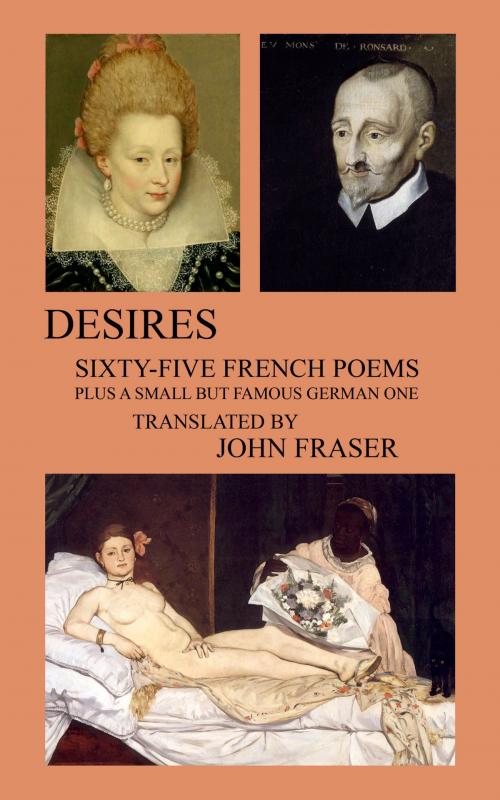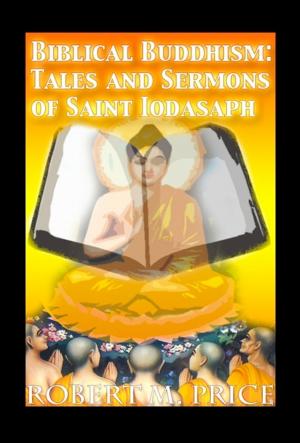Desires; Sixty-five French Poems Plus a Small But Famous German One
Nonfiction, Entertainment, Drama, Continental European, Fiction & Literature, Literary Theory & Criticism| Author: | John Fraser | ISBN: | 9781456622145 |
| Publisher: | eBookIt.com | Publication: | August 8, 2015 |
| Imprint: | eBookIt.com | Language: | English |
| Author: | John Fraser |
| ISBN: | 9781456622145 |
| Publisher: | eBookIt.com |
| Publication: | August 8, 2015 |
| Imprint: | eBookIt.com |
| Language: | English |
John Fraser, Desires: Sixty-five French poems and one small but famous German one, translated and introduced by John Fraser.
The core of Desires is a mini-anthology of sixty-five French poems translated by John Fraser and described in the foreword by scholar-translator Benoit Tadié as "beautiful" and "intensely empathetic." Taken from Fraser's major online anthology A New Book of Verse, they belong in an emergent re-seeing of French poetic history.
Part I consists largely of "libertine" (free-thinking) poems from the Renaissance and 17th century, in which the joys of Eros are celebrated within a realworld context of the body's limitations (age, impotence, the pox) and savage punishments for "heresy" (lethal imprisonment, burning at the stake). The language, at times unfussily direct, at others richly figurative, is refreshingly free of Petrarchan and neo-classical clichés.
Among the male poets are Ronsard, Théophile de Viau, and Claude Le Petit. Among the women, witty aristocrats with minds and desires of their own, like Heliette de Vivonne and Louise-Marguerite de Lorraine. The classicism (real, not neo-) of Part I is followed in Part II by the classical romanticism of a variety of 19th and 20th century poems. There had been underground continuities during the neo-classical dominance..
The book includes major discoveries like Le Petit's 300-line "Farewell of the Pleasure Girls to the City of Paris" and Jeanne-Marie Durry's "Orpheus' Plea"; subversive poems by radicals like Louise Michel, Aristide Bruand, and Georges Brassens; and fresh translations of poems by classics like Desbordes-Valmore. Gautier, Laforgue, and Apollinaire, including the last-named's notoriously difficult "Lul de Faltenin." There is a long iconoclastic introduction, numerous notes, and an affectionate appendix on Gerard de Nerval and classical-romanticism, with very funny quotations from his fiction.
The eleven hundred Anglo, French, and German poems in A New Book of Verse can be accessed via Voices in the Cave of Being.
The core of Desires is a mini-anthology of sixty-five French poems translated by John Fraser and described in the foreword by scholar-translator Benoit Tadié as "beautiful" and "intensely empathetic." Taken from Fraser's major online anthology A New Book of Verse, they belong in an emergent re-seeing of French poetic history.
Part I consists largely of "libertine" (free-thinking) poems from the Renaissance and 17th century, in which the joys of Eros are celebrated within a realworld context of the body's limitations (age, impotence, the pox) and savage punishments for "heresy" (lethal imprisonment, burning at the stake). The language, at times unfussily direct, at others richly figurative, is refreshingly free of Petrarchan and neo-classical clichés.
Among the male poets are Ronsard, Théophile de Viau, and Claude Le Petit. Among the women, witty aristocrats with minds and desires of their own, like Heliette de Vivonne and Louise-Marguerite de Lorraine. The classicism (real, not neo-) of Part I is followed in Part II by the classical romanticism of a variety of 19th and 20th century poems. There had been underground continuities during the neo-classical dominance..
The book includes major discoveries like Le Petit's 300-line "Farewell of the Pleasure Girls to the City of Paris" and Jeanne-Marie Durry's "Orpheus' Plea"; subversive poems by radicals like Louise Michel, Aristide Bruand, and Georges Brassens; and fresh translations of poems by classics like Desbordes-Valmore. Gautier, Laforgue, and Apollinaire, including the last-named's notoriously difficult "Lul de Faltenin." There is a long iconoclastic introduction, numerous notes, and an affectionate appendix on Gerard de Nerval and classical-romanticism, with very funny quotations from his fiction.
The eleven hundred Anglo, French, and German poems in A New Book of Verse can be accessed via Voices in the Cave of Being.
John Fraser, Desires: Sixty-five French poems and one small but famous German one, translated and introduced by John Fraser.
The core of Desires is a mini-anthology of sixty-five French poems translated by John Fraser and described in the foreword by scholar-translator Benoit Tadié as "beautiful" and "intensely empathetic." Taken from Fraser's major online anthology A New Book of Verse, they belong in an emergent re-seeing of French poetic history.
Part I consists largely of "libertine" (free-thinking) poems from the Renaissance and 17th century, in which the joys of Eros are celebrated within a realworld context of the body's limitations (age, impotence, the pox) and savage punishments for "heresy" (lethal imprisonment, burning at the stake). The language, at times unfussily direct, at others richly figurative, is refreshingly free of Petrarchan and neo-classical clichés.
Among the male poets are Ronsard, Théophile de Viau, and Claude Le Petit. Among the women, witty aristocrats with minds and desires of their own, like Heliette de Vivonne and Louise-Marguerite de Lorraine. The classicism (real, not neo-) of Part I is followed in Part II by the classical romanticism of a variety of 19th and 20th century poems. There had been underground continuities during the neo-classical dominance..
The book includes major discoveries like Le Petit's 300-line "Farewell of the Pleasure Girls to the City of Paris" and Jeanne-Marie Durry's "Orpheus' Plea"; subversive poems by radicals like Louise Michel, Aristide Bruand, and Georges Brassens; and fresh translations of poems by classics like Desbordes-Valmore. Gautier, Laforgue, and Apollinaire, including the last-named's notoriously difficult "Lul de Faltenin." There is a long iconoclastic introduction, numerous notes, and an affectionate appendix on Gerard de Nerval and classical-romanticism, with very funny quotations from his fiction.
The eleven hundred Anglo, French, and German poems in A New Book of Verse can be accessed via Voices in the Cave of Being.
The core of Desires is a mini-anthology of sixty-five French poems translated by John Fraser and described in the foreword by scholar-translator Benoit Tadié as "beautiful" and "intensely empathetic." Taken from Fraser's major online anthology A New Book of Verse, they belong in an emergent re-seeing of French poetic history.
Part I consists largely of "libertine" (free-thinking) poems from the Renaissance and 17th century, in which the joys of Eros are celebrated within a realworld context of the body's limitations (age, impotence, the pox) and savage punishments for "heresy" (lethal imprisonment, burning at the stake). The language, at times unfussily direct, at others richly figurative, is refreshingly free of Petrarchan and neo-classical clichés.
Among the male poets are Ronsard, Théophile de Viau, and Claude Le Petit. Among the women, witty aristocrats with minds and desires of their own, like Heliette de Vivonne and Louise-Marguerite de Lorraine. The classicism (real, not neo-) of Part I is followed in Part II by the classical romanticism of a variety of 19th and 20th century poems. There had been underground continuities during the neo-classical dominance..
The book includes major discoveries like Le Petit's 300-line "Farewell of the Pleasure Girls to the City of Paris" and Jeanne-Marie Durry's "Orpheus' Plea"; subversive poems by radicals like Louise Michel, Aristide Bruand, and Georges Brassens; and fresh translations of poems by classics like Desbordes-Valmore. Gautier, Laforgue, and Apollinaire, including the last-named's notoriously difficult "Lul de Faltenin." There is a long iconoclastic introduction, numerous notes, and an affectionate appendix on Gerard de Nerval and classical-romanticism, with very funny quotations from his fiction.
The eleven hundred Anglo, French, and German poems in A New Book of Verse can be accessed via Voices in the Cave of Being.















